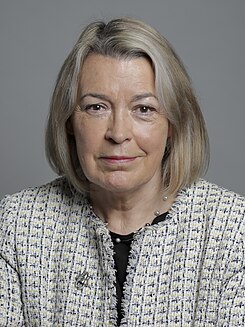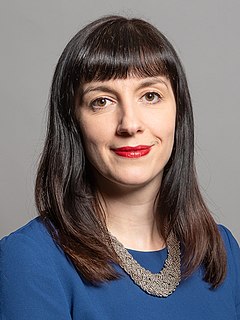Related Research Articles

Stephen Twigg is a British Labour Co-op politician who was Member of Parliament for Enfield Southgate from 1997 to 2005, and for Liverpool West Derby from 2010 to 2019.

Dame Angela Eagle DBE is a British Labour Party politician serving as the Member of Parliament (MP) for Wallasey since 1992. Eagle was born in Yorkshire and studied PPE at the University of Oxford, before working for the CBI and then a trade union.

Maria Eagle is a British politician who served in the governments of Tony Blair and Gordon Brown. She later served in the Shadow Cabinets of Ed Miliband and Jeremy Corbyn. A member of the Labour Party, she has been Member of Parliament (MP) for Garston and Halewood, previously Liverpool Garston, since 1997.

Christopher Michael Leslie is a British politician who served as the Member of Parliament (MP) for Shipley from 1997 to 2005 and Nottingham East from 2010 to 2019. A former member of the Labour Party, he defected to form Change UK and later became an independent politician.

Jon Hedley Trickett is a British Labour politician who has been the Member of Parliament (MP) for Hemsworth in West Yorkshire since a 1996 by-election. He was Shadow Lord President of the Council from 2016 to 2020 and served as Shadow Minister for the Cabinet Office from 2011 to 2013 and 2017 to 2020. He was the Labour Party National Campaign Coordinator under Jeremy Corbyn from 2015 to 2017.

Her Majesty's Most Loyal Opposition, or the Official Opposition, in the United Kingdom, is the main political opposition to Her Majesty's Government. This is usually the political party with the second-largest number of seats in the House of Commons, as the largest party will usually form the government. Since May 2010, the Official Opposition has been the Labour Party, led by Keir Starmer since 2020.

Wallasey is a constituency created in 1918 represented in the House of Commons of the UK Parliament since 1992 by Angela Eagle, a member of the Labour Party.

Sharon Hodgson is a British Labour Party politician serving as the Member of Parliament (MP) for Washington and Sunderland West, previously Gateshead East and Washington West, since 2005.

Barbara Mary Keeley is a British Labour Party politician who has served as the Member of Parliament (MP) for Worsley and Eccles South, previously Worsley, since 2005. A member of the Labour Party, she has served as Shadow Minister for Arts and Civil Society since 2022. She previously served as Deputy Leader of the House of Commons from 2009 to 2010 and served in Jeremy Corbyn’s Shadow Cabinet as Shadow Minister for Mental Health and Social Care from 2016 to 2020.

The Leader of the Labour Party is the head of the Labour Party of the United Kingdom. The current leader is Sir Keir Starmer, who was elected in April 2020 to succeed Jeremy Corbyn, having previously spent 9 months as Shadow Minister of Immigration and 3 years, 5 months as Shadow Secretary of State for Exiting the European Union in Corbyn's shadow cabinet.

Bridget Maeve Phillipson is a British politician serving as Shadow Secretary of State for Education since 2021. A member of the Labour Party, she has been Member of Parliament for Houghton and Sunderland South since 2010. She served as Shadow Chief Secretary to the Treasury from 2020 to 2021.
The Commons members of the Parliamentary Labour Party (PLP) elected 19 members of the Shadow Cabinet from among their number in 2010. This follows the Labour Party's defeat at the 2010 general election, after which the party formed the Official Opposition in the United Kingdom.
Elections to the Labour Party's Shadow Cabinet took place in October 1993, at the beginning of the 1993/1994 session of parliament. Under the rules then in effect, the Commons members of the Parliamentary Labour Party elected 18 members of the Official Opposition Shadow Cabinet, who were then assigned portfolios by the leader. The Commons members of the PLP separately elected the Chief Whip, and the Labour peers elected the Leader of the Opposition in the House of Lords. In addition, the Leader of the Labour Party and Deputy Leader were members by virtue of those offices. The 18 elected members of the Shadow Cabinet were the ones with the largest number of votes. Beginning with this election, MPs were required to vote for at least four women, but women were no longer guaranteed three places in the Shadow Cabinet.
Elections to the Labour Party's Shadow Cabinet took place in October 1994, at the beginning of the 1994/5 session of parliament. Under the rules then in effect, the Commons members of the Parliamentary Labour Party elected 18 members of the Official Opposition Shadow Cabinet, who were then assigned portfolios by the leader. The Commons members of the PLP separately elected the Chief Whip, and the Labour peers elected the Leader of the Opposition in the House of Lords. In addition, the Leader of the Labour Party and Deputy Leader were members by virtue of those offices. The 18 elected members of the Shadow Cabinet were the ones with the largest number of votes. MPs were required to vote for at least four women, but women were not necessarily guaranteed places in the Shadow Cabinet.
Elections to the Labour Party's Shadow Cabinet took place in October 1995, at the beginning of the 1995/6 session of parliament. Under the rules then in effect, the Commons members of the Parliamentary Labour Party elected 19 members of the Official Opposition Shadow Cabinet, who were then assigned portfolios by the leader. The Labour peers elected the Leader of the Opposition in the House of Lords. In addition, the Leader of the Labour Party and Deputy Leader were members by virtue of those offices. With this election, for the first time, the role Opposition Chief Whip was simply another portfolio to be handed out rather than an office separately elected by the PLP. The 19 elected members of the Shadow Cabinet were the ones with the largest number of votes. MPs were required to vote for at least four women, but women were not necessarily guaranteed places in the Shadow Cabinet.
Elections to the Labour Party's Shadow Cabinet took place in July 1996. Under the rules then in effect, the Commons members of the Parliamentary Labour Party elected 19 members of the Official Opposition Shadow Cabinet, who were then assigned portfolios by the leader. The Labour peers elected the Leader of the Opposition in the House of Lords. In addition, the Leader of the Labour Party and Deputy Leader were members by virtue of those offices. The 19 elected members of the Shadow Cabinet were the ones with the largest number of votes. MPs were required to vote for at least four women, but women were not necessarily guaranteed places in the Shadow Cabinet.

Ed Miliband became Leader of the Labour Party and Leader of the Opposition upon being elected to the former post on 25 September 2010. The election was triggered by Gordon Brown's resignation following the party's fall from power at the 2010 general election, which yielded a Conservative – Liberal Democrat Coalition. Miliband appointed his first Shadow Cabinet in October 2010, following the Labour Party's Shadow Cabinet elections. These elections were the last such elections before they were abolished in 2011.
Elections to the Labour Party's Shadow Cabinet took place on 24 October 1990. Under the rules then in effect, the Commons members of the Parliamentary Labour Party elected 18 members of the Official Opposition Shadow Cabinet, who were then assigned portfolios by the leader. The Commons members of the PLP separately elected the Chief Whip, and the Labour peers elected the Leader of the Opposition in the House of Lords. In addition, the Leader of the Labour Party and Deputy Leader were members by virtue of those offices.
Elections to the Labour Party's Shadow Cabinet took place on 23 October 1991. Under the rules then in effect, the Commons members of the Parliamentary Labour Party elected 18 members of the Official Opposition Shadow Cabinet, who were then assigned portfolios by the leader. The Commons members of the PLP separately elected the Chief Whip, and the Labour peers elected the Leader of the Opposition in the House of Lords. In addition, the Leader of the Labour Party and Deputy Leader were members by virtue of those offices.
Elections to the Labour Party's Shadow Cabinet occurred in November 1989. For these elections the Shadow Cabinet was expanded from 15 to 18 seats and, for the first time, MPs had to cast at least three votes for women.
References
- "Shadow Cabinet Elections in the 1992 Parliament". Archived from the original on 14 July 2010. Retrieved 24 May 2010.


